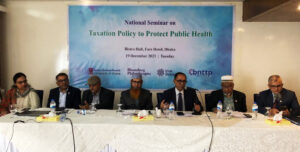Speakers at National Seminars
Health Tax Policy will Reduce Medical Expenses

The health system in Bangladesh is seeing a notable increase in both expenditure and pressure because the illness is affecting a growing number of people throughout the nation. Non-communicable diseases account for 70% of all deaths in the nation currently. Therefore, by enforcing a health tax policy, it is feasible to lower government and individuals’ medical costs. In this instance, a high tax rate must be applied on sugar-filled meals, beverages, and tobacco products. Analysts in the fields of economics, public health, and tobacco control suggested that a health tax policy ought to be developed concurrently.
Today, December 19, 2023, Tuesday, at 10 a.m., they said these things at the national seminar titled ‘Taxation Policy to Protect Public Health’ at Bistro Conference Room of FARS Hotel and Restaurant in Dhaka. Bureau of Economic Research (BER), University of Dhaka and Bangladesh Network for Tobacco Tax Policy (BNTTP) jointly organized this seminar.
Saidur Rahman, Additional Secretary of the Ministry of Health, was present as the chief guest in the event. Former NBR chairman Dr. Nasiruddin Ahmed presided over the seminar and Dr. Enamul Haque, Director General of Health Economic Unit, National Tobacco Control Cell Coordinator (Additional Secretary) Hossain Ali Khondokar, Vital Strategies Head of Programs Shafiqul Islam and Consultant Fahimul Islam were present as special guests in the program.
Besides, advocate Syed Mahbubul Alam, Senior Technical Advisor of Vital Strategies gave a welcome speech at the seminar. Dr. Rumana Haque, Professor of Economics Department, University of Dhaka, presented the main article at the seminar.
Speakers in the seminar said that the rate of non-communicable diseases is increasing rapidly due to the consumption of sugar, sweets, beverages, and tobacco products in the country.
Studies showed that 95.4 percent of university students and 48% of school children presently drink sugar-filled soft drinks. A person who regularly eats these beverages or sugary meals will put on five pounds yearly. Furthermore, there was a 26% increase in their risk of type 2 diabetes. Sugar-filled diets therefore represent a significant risk to human health.
Additionally, they stated that tobacco-related diseases claim the lives of roughly 1,61,000 individuals in Bangladesh each year. The estimated cost of treating illnesses linked to tobacco use in 2018 was close to thirty thousand crores which has increased alarmingly.
As stated by the Honorable Prime Minister, developing a robust tobacco tax policy is the first step toward making the nation smoke-free by 2040. At the same time specific tax should be imposed on all types of tobacco products. This will increase the revenue of the government as well as reduce the expenditure related to tobacco.
They also said that in addition to sugary foods, drinks and tobacco products, environment tax should be imposed on any company and organization that harms the environment. The funds must be used concurrently to avert environmental catastrophes like climate change. Which will decrease the possibility of a natural disaster.
At the same time, they increased the price of tobacco products to reduce the availability of tobacco; identifying areas of tobacco tax evasion and taking measures to stop it;
They urged for the formulation and implementation of a strong tobacco tax policy on an urgent basis as per the Prime Minister’s announcement to bring all related matters under the rules including introduction of digital system for revenue collection.
The meeting was attended by tobacco control experts, development workers and journalists, among others, representatives from NBR’s Large Taxpayer Unit, Bangladesh Competition Commission, Bangladesh Trade and Tariff Commission, Health Economics Unit, National Institute of Local Government, National Institute of Preventive and Social Medicine.

